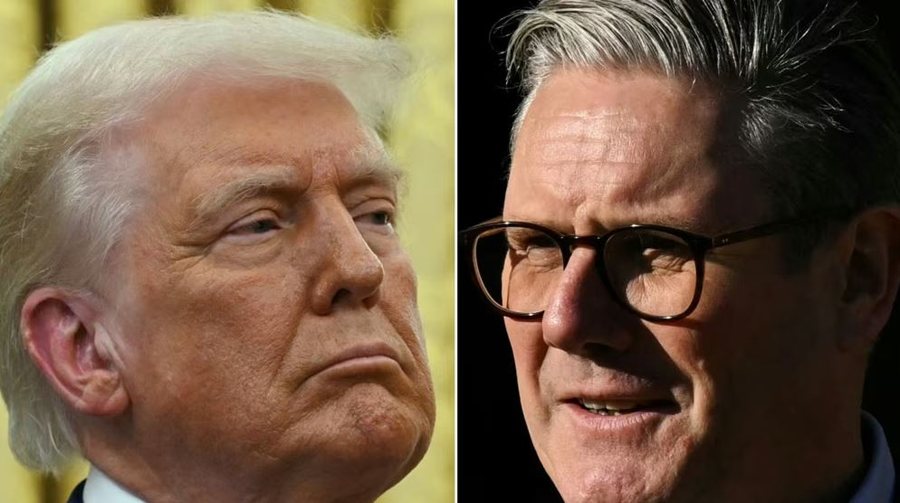
British Prime Minister Keir Starmer will meet with President Donald Trump at the White House on Thursday to discuss the war in Ukraine and bilateral trade ties. The US president has threatened to impose tariffs on Europe and called for the continent to rely less on Washington for its security.
Ahead of the meeting, President Trump, who wants NATO members to increase defense spending to 5% of gross domestic product, reiterated his stance that Europe must be “empowered.” He told reporters at the White House on Wednesday that American taxpayers “should not be paying more than Europeans.”
In what appears to be an attempt to show compliance with President Trump's demand, on Tuesday, Prime Minister Starmer announced a surprise increase in the UK's defense budget to 2.5% of GDP by 2027. Prime Minister Starmer said that the following year the defense budget will increase to 2.6% of GDP.
“When I meet President Trump, I will be clear: I want the relationship between our countries to be strengthened,” Prime Minister Starmer told MPs in the British parliament. He called the relationship with Washington his country’s “most important alliance.”
Prime Minister Starmer told reporters on Tuesday that the increase in defense spending is a process that began three years ago, after the start of Russian aggression against Ukraine in 2022. The increase in spending will be financed by cutting the budget for foreign aid. That aid will now be just 0.3% of GDP.
He acknowledged that the decision to increase defense spending was "accelerated" as President Trump began meetings with Moscow, without the involvement of Ukraine, or the Europeans, and made it clear that he was reducing American support for European security.
"President Trump thinks we need to do more and I agree with him. That's my view," Mr Starmer said. He added that he also aims to further increase defence spending to 3% in a possible next term, which would start in 2029, after the next election.
During his meeting with President Trump, Prime Minister Starmer will try to reinforce the position that Europeans should be part of any discussion on the war in Ukraine, said Gesine Weber of the German Marshall Fund.
"It would be very strange to have a situation where the burden is passed to the Europeans, but not the responsibility and strategic reflections," Ms. Weber told Voice of America.
In 2023, the United States spent 3.4% of GDP on defense, according to US government data compiled by the Stockholm International Peace Research Institute.
European peacekeepers
Prime Minister Starmer's meeting comes after French President Emmanuel Macron visited the White House on Monday. The French president has proposed the creation of a European peacekeeping force in Ukraine as a security guarantee against future Russian aggression, a plan that Prime Minister Starmer supports.
Under this scenario, the United States "would do less in normal times, but would be ready to help" if a crisis broke out, Michael O'Hanlon of the Brookings Institution told VOA.
It remains to be seen whether the plan will be implemented taking into account the different interests within NATO and the European Union, Mr. O'Hanlon said.
“The most important question is whether the two leaders will have a good relationship? Do they have a shared vision?” he says of President Trump and Prime Minister Starmer, because this could signal the emergence of a Western strategy to end the war, with the support of NATO.
"If that is the case, then we are in a good position to make efforts to promote negotiations between Russia and Ukraine," he added.
On Wednesday, President Trump signaled that Ukraine should "forget" about NATO membership and that it should not expect much from Washington.
"I'm not going to offer too many guarantees on security. Europe has to do that, because the Europeans are their neighbor," President Trump said.
In addition to discussing with Moscow, President Trump is demanding from Kiev to reach an agreement on Ukraine's rare minerals and reimburse funds provided by the Biden administration to support the country's war efforts.
Ukrainian President Volodymyr Zelensky is expected to meet with President Trump at the White House on Friday.
Threats of tariffs
The visit is a challenge for Prime Minister Starmer as he seeks to balance the UK's interests with those of European allies while engaging with the new United States administration.
He will want to secure favorable terms for Britain in the event of US tariffs that could affect British exports. Washington has imposed 25% tariffs on steel and aluminum imported from European countries. President Trump is threatening to impose more tariffs, saying the European Union has been “very unfair” to America.
Prime Minister Starmer is "in a bit of a delicate position" as the UK is not part of the European Union's single market, said Ms Weber of the German Marshall Fund.
"For him, the essential issue is to avoid imposing tariffs by America and to try not to antagonize Washington and at the same time to pursue a very confrontational line with the European Union," she said.
British Finance Minister Rachel Reeves said Wednesday she was confident that U.S.-Britain trade and investment would not be harmed by President Trump's tariff threats./ VOA (A2 Televizion)











